Quick Introduction
What happens when civilization collides with the wild unknown? Conrad In Heart of Darkness by Joseph Conrad, we follow a man’s journey into the heart of Africa, which turns into a chilling exploration of the human dark side. The story is set in the late 19th century, during the “Scramble for Africa,” a time when European countries raced to claim African lands and resources. They called it a “civilizing mission” and even used ideas like Social Darwinism to justify their actions. But the reality? It was a nightmare of forced labor, violence, and exploitation, especially in places like the Congo Free State. Conrad himself took on a position as a captain, just like Charles Marlow, and saw what was happening in the Congo States. Disillusioned with the cruelty? More likely.
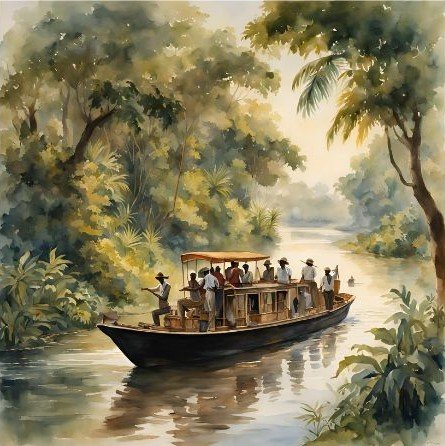
Told through the eyes of Charles Marlow, a sailor who’s got a lot to say about what he sees, the story pulls back the curtain on the greed and cruelty of colonialism. Marlow’s thoughts strip away the polished image of “civilization” to reveal its darker, messier side. Honestly, though, it feels like Conrad is sharing his own thoughts here. It’s a gripping tale that gets you thinking about morality, power, ambition, and just how dark human nature can get when there’s nothing to keep it in check.
Why Read This Book?
Joseph Conrad’s Heart of Darkness isn’t just a story—it’s a deep dive into ideas like imperialism and morality and explores the dark side of human nature. On the surface, it critiques the so-called “civilizing mission” of European colonial powers. But dig a little deeper, and you’ll find it’s peeling back the shiny mask of civilization to reveal the greed and cruelty underneath.
This book is packed with rich symbolism and psychological twists that keep you thinking long after you’ve turned the last page. It doesn’t shy away from tough questions, like whether humans are naturally good or if we’re all just one bad day away from chaos. Even though it was written over a century ago, Heart of Darkness still challenges us to rethink what we know about power, empire, and our own inner darkness.
Plot Summary
High-Level Overview
Heart of Darkness follows Charles Marlow, a seasoned sailor with plenty on his mind. At first, he’s just curious, ready to explore the unknown. He’s tasked with heading up the Congo River to track down Kurtz, a legendary ivory trader who’s gone a bit… well, wild. What seems like a simple job, though, quickly turns into something much bigger—a journey into the depths of Africa and some unsettling truths about human nature.
As Marlow travels, he sees firsthand the greed and cruelty of European imperialism. The local people are treated horribly, reduced to tools for extracting wealth, and it’s clear that the so-called “civilizing mission” is anything but.
The real mystery of the story is Kurtz. He starts out as a man with big dreams and high ideals, but life in the wilderness changes him. By the time Marlow gets close, Kurtz has become like a god to the locals, but his power has come at the cost of his sanity and morality. Marlow’s encounters with people who knew Kurtz reveal just how far the man has fallen—and how much it says about the world they both come from.
Core Conflict
Heart of Darkness is the clash between civilization and savagery and the emotional toll of facing some pretty harsh truths about humanity. As Marlow travels deeper into the jungle, his journey isn’t just about navigating rivers; it’s also about navigating his own mind. He starts to realize that the “darkness” he sees in others might be lurking inside himself, too.
At its core, this story isn’t just about the breakdown of rules and order. It’s about what happens when the thin layer of “civilization” is stripped away, leaving us face-to-face with the messy, moral chaos underneath. It’s both a personal struggle for Marlow and a broader look at the darker side of human nature—and it’s as unsettling as it is thought-provoking.
Key Characters
Protagonist
Charles Marlow
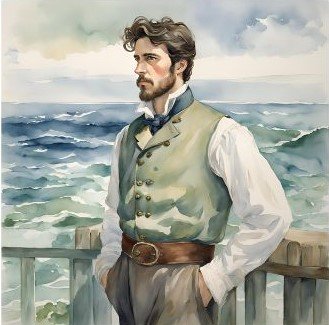
Charles Marlow, our thoughtful and sharp-eyed narrator, leads us through the twists and turns of this story. He signs up as a riverboat captain for a Belgian trading company and sets off into the Congo. At first, it seems like an exciting adventure, but things quickly get a lot more complicated. Marlow finds himself staring into the harsh realities of imperialism and questioning everything he once believed about morality and human nature. This isn’t just a boat trip through rivers and jungles—it’s a plunge into the thin, fragile shell of civilization and the shadows hiding beneath it. As the story unfolds, Conrad hints that Marlow and he might share more than a few traits, blurring the line between narrator and author.
Antagonist
Mr. Kurtz
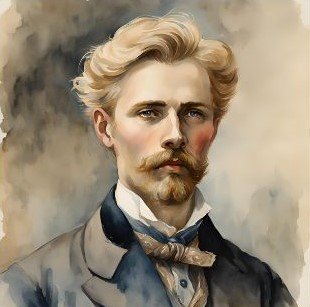
Mr. Kurtz is a larger-than-life ivory trader who starts out idealistic but spirals into madness and moral collapse. Alone in the Congo, with unchecked power and no one to challenge him, Kurtz becomes a figure of god-like authority to the locals. But his grip on humanity crumbles, leaving him consumed by darkness. His eerie last words, “The horror! The horror!” sum up his terrifying realization of the depravity in himself and in humanity as a whole.
Supporting Characters
The Manager
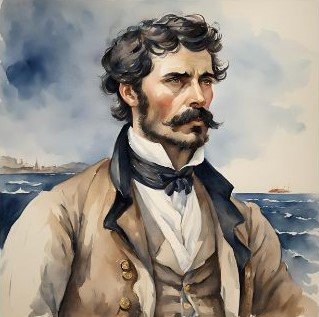
The Manager is an interesting character—so bland he doesn’t even get a name in the story! He’s a mysterious guy who’s all about greed and keeping things running smoothly, no matter who gets hurt along the way. Profits are his priority, plain and simple. What really bothers him? Kurtz. Kurtz has everything the Manager doesn’t—ambition, charisma, and big ideas (even if they’re flawed). That makes the Manager the perfect contrast to Kurtz. While Kurtz is larger-than-life, the Manager is the poster child for boring, self-serving bureaucracy. He’s not about vision or greatness; he’s the hollow, corporate face of imperialism at its worst.
fiancée
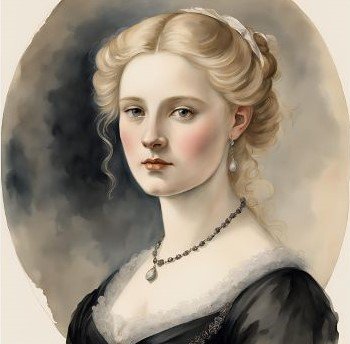
Kurtz’s fiancée, known as his Intended, is the very image of innocence and blind idealism. She’s introduced to shine a spotlight on how much Kurtz has changed. Before his time in Africa, Kurtz was full of promise, talent, and big ideas. But the Congo changed him, pulling him into a world of unchecked ambition, cruelty, and the dark side of imperialism. Meanwhile, she clings tightly to her romanticized vision of Kurtz and the so-called greatness of European civilization. This creates a powerful contrast to the harsh, ugly reality of colonialism that Marlow witnesses. It’s no wonder Marlow couldn’t bring himself to tell her the truth about Kurtz—it would have shattered her world.
Character Dynamics
The connection between Marlow and Kurtz is the beating heart of the story. Marlow is fascinated by Kurtz’s brilliance and charm but horrified by his moral decay. In many ways, Kurtz is a mirror, forcing Marlow to confront his own inner struggles. Their relationship captures the novella’s exploration of humanity’s incredible potential for greatness—and its terrifying capacity for darkness.
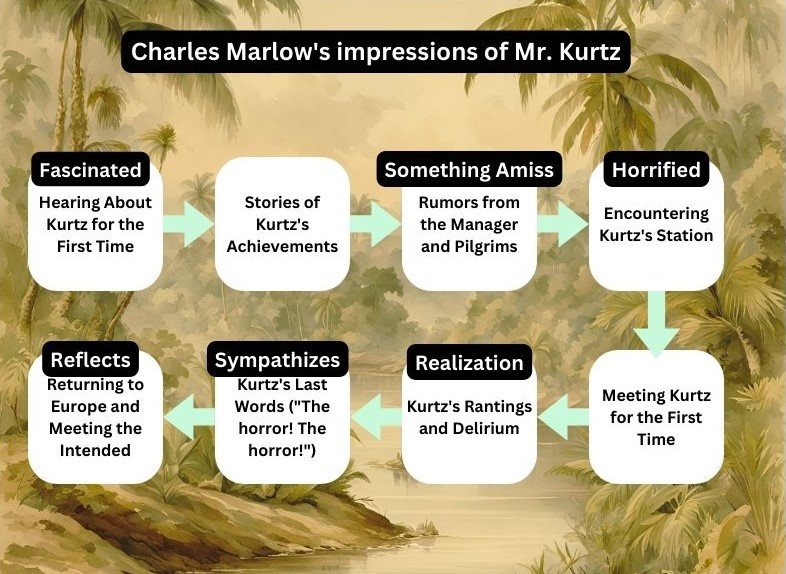
What to Look For While Reading
Themes
Imperialism and Exploitation
At its heart, Heart of Darkness takes a hard look at European colonialism and doesn’t hold back. It pulls back the curtain on the so-called “civilizing mission” and reveals it for what it really was—greedy, violent, and downright cruel. Instead of spreading knowledge and progress as they claimed, imperialism brought nothing but suffering for the people and destruction for the land. Conrad’s story shows how this “mission” was more about exploitation than enlightenment, all dressed up in the name of progress.
Darkness Within
The novella dives deep into a chilling idea: the real darkness isn’t out there in the wild—it’s inside us. Heart of Darkness suggests that the evil we fear might just be part of being human. It also asks some tough questions: do the rules of society keep us in check, or are they just flimsy masks hiding what’s underneath? These ideas make us think hard about morality and what it means to be human—and the answers aren’t exactly comforting.
Alienation and Isolation
Mr. Kurtz’s isolation deep in the Congo is a scary reminder of how fragile sanity can be. Away from society’s rules and structure, Kurtz completely loses his grip on reality. His slide into madness shows just how fast the thin layer of civilization can crack when someone is left alone to face the wild, raw truths of life. It’s like peeling back the shiny surface of humanity to find something much darker underneath—and it’s not a pretty sight.
Symbolism
The Congo River
The river isn’t just a waterway; it’s a two-in-one symbol. On one hand, it’s the literal path into the wild heart of Africa. On the other hand, it’s a metaphor for venturing into the unknown—both the physical and the psychological. As Marlow travels deeper into the jungle, the river reflects his own inner journey, pulling him further into the moral messiness of imperialism and the darker corners of human nature. I don’t explain too much of them here. The use of the river as the symbolism is quite similar to that of the Adventure of Huckleberry Finn by Mark Twain.
Darkness
Darkness pops up again and again in the novella, and it’s much more than just the absence of light. It’s a stand-in for ignorance, savagery, and the corruption lurking behind the polished mask of civilization. Conrad uses it to make us rethink what it really means to be “civilized” and whether the so-called “savage” might actually have the moral high ground.
Kurtz’s Final Words
“The horror! The horror!”—talk about a mic-drop moment. These haunting words are Kurtz’s final realization about life, and they pack a punch. While Conrad doesn’t spell it out, it seems Kurtz is confronting the darkest truths about himself and the world around him. It’s like he suddenly sees all the greed, cruelty, and emptiness of life laid bare.
This moment hits Marlow hard. He’s already been shaken by everything he’s seen, but hearing these words is like a gut punch to his view of humanity. It forces him to wrestle with the same big question: What are we really made of? Are we all capable of falling into the same abyss as Kurtz?
When it comes to Kurtz’s fiancée, Marlow just can’t bring himself to share these words with her. She’s holding onto this pure, romantic image of Kurtz, and dropping “The horror! The horror!” on her would destroy that. Plus, Marlow seems to feel that sparing her the truth is an act of kindness—protecting her from the darkness that consumed Kurtz and almost swallowed him, too.
Narrative Style
In Heart of Darkness, Joseph Conrad uses a frame narrative to tell the story. Marlow recounts his adventure to a group of listeners aboard a boat on the Thames River. It’s like a story within a story, adding layers and making things more interesting (and a little tricky). This style distorts readers from the events, making the tale feel deeper and more complex.
Marlow’s way of telling the story is super reflective—he’s full of deep thoughts and vivid descriptions. But here’s the catch: he’s not exactly the most reliable narrator. His own experiences and struggles shape how he sees everything, from the people he meets to the events he describes. Readers are left to figure out what’s true and what’s colored by Marlow’s perspective.
To make things even more layered, an outer narrator frames Marlow’s tale, adding yet another filter between us and the “truth.” This blurring of reality and perception matches the novella’s themes of ambiguity and moral complexity. Conrad’s narrative style pulls readers in, making us not just observers but active interpreters. This clever technique adds psychological depth and keeps us questioning everything—even long after we’ve finished the book.
Takeaway Lessons
Personal Reflection
Reading Heart of Darkness reminded me of Lord of the Flies. Both stories dive into what happens when the power goes unchecked, and chaos takes over. Conrad’s novella takes a darker turn, though—it really digs into the best and worst sides of human nature. Sure, we’re capable of amazing things, but when greed and ambition take the wheel, we’ve got a real talent for destruction.
What really stands out in Heart of Darkness is its bold critique of colonialism. It tears apart the idea of the “civilizing mission,” showing how it dehumanized everyone—both the colonizers and the colonized. The imagery is haunting, and Marlow’s thoughtful narration keeps hitting you with big questions. Like, where do we draw the line between being civilized and being savage? Spoiler alert: that line’s way thinner than we’d like to think.
After finishing the book, I couldn’t help but wonder—would I have lost my mind like Kurtz if I’d been in his shoes? Venturing into the unknown, with no one around to keep me in check, feels like a recipe for disaster. Conrad seems to be telling us that, at our core, humans are cruel and greedy. It’s the rules, laws, and systems of control that keep us from spiraling into chaos. Without them, well, let’s just say things get dark.
Discussion Points:
- Is Marlow a reliable narrator, or does his perspective distort the truth about imperialism, Kurtz, and the events he describes? How might his biases shape the story?
- How does Conrad’s portrayal of “darkness” challenge traditional notions of civilization versus savagery? Does he suggest that the true savagery lies in the wilderness or within the so-called civilized world?
Final Recommendation
Who Should Read This Book?
If you’re into big ideas like philosophy and history or figuring out what makes humans tick, Heart of Darkness is definitely your kind of book. It’s perfect for readers who love diving into the messy moral and ethical questions around imperialism or exploring the darker sides of human ambition.
One thing I noticed is that it shares something with Mark Twain’s Adventures of Huckleberry Finn—both stories use a river as a symbol of a physical and psychological journey. Of course, the two are pretty different when it comes to tone, style, and cultural context, but it’s a cool connection if you enjoy looking for deeper meanings in stories.
Closing Statement
Take the plunge into Heart of Darkness and uncover its powerful (and sometimes unsettling) truths about humanity. Sure, it’s a challenging read, but it’s well worth the effort. This novella is a fascinating journey through the murky waters of civilization, morality, and human nature. It also shows the dark side of Colonization.